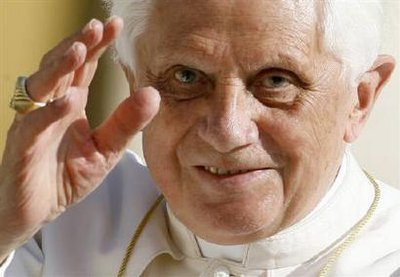The Holy Father Preaches: Grace and Penitence

I translated this small section of the spontaneous homily given by the Holy Father on the morning of Thursday, April 15, 2010, during a Mass in the Pauline Chapel with the members of the Pontifical Biblical Commission. Today we celebrate the Saturday memorial of the Blessed Virgin Mary. She who, echoing the preaching of her Son, has called us to penance again and again in her apparitions over the past two hundred years, is also the Mediatrix of the graces of penitence, of compunction, and of trust in Divine Mercy.
La penitenza è grazia; è una grazia che noi riconosciamo il nostro peccato, è una grazia che conosciamo di aver bisogno di rinnovamento, di cambiamento, di una trasformazione del nostro essere.
Penitence is a grace. It is a grace that we recognize our sin, and a grace that we acknowledge our need of renewal, of change, of a transformation of our being.
Penitenza, poter fare penitenza, è il dono della grazia. E devo dire che noi cristiani, anche negli ultimi tempi, abbiamo spesso evitato la parola penitenza, ci appariva troppo dura. Adesso, sotto gli attacchi del mondo che ci parlano dei nostri peccati, vediamo che poter fare penitenza è grazia. E vediamo che è necessario far penitenza, cioè riconoscere quanto è sbagliato nella nostra vita, aprirsi al perdono, prepararsi al perdono, lasciarsi trasformare. Il dolore della penitenza, cioè della purificazione, della trasformazione, questo dolore è grazia, perché è rinnovamento, è opera della misericordia divina. E così queste due cose che dice san Pietro – penitenza e perdono – corrispondono all’inizio della predicazione di Gesù: “metanoeite”, cioè convertitevi (cfr. Marco 1, 15). Quindi questo è il punto fondamentale: la “metanoia” non è una cosa privata, che parrebbe sostituita dalla grazia, ma la “metanoia” è l’arrivo della grazia che ci trasforma.
Penitence, to do penance, is a gift of grace. And I must say that we Christians, even in these last days, have often avoided the word penance. It seemed to us too harsh. Now, under the attacks of the world that speak to us of our sins, we see that to be able to do penance is a grace. And we see that it is necessary to do penance, that is, to recognize what is not right in our lives, to open ourselves to pardon, to prepare ourselves for pardon, to allow ourselves to be transformed. The sorrow of penitence, that is, of purification, of the transformation of this sorrow, is grace, because it is renewal, and the work of divine mercy. And so, these two things that Saint Peter says, — penitence and pardon — correspond to the beginning of Jesus’ preaching: metanoeite, that is “Be ye converted” (Mark 1:15). This, therefore, is the fundamental point: metanoia is not a private thing, that appears to be substituted for grace. Metanoia is, rather, the arrival of grace that transforms us.
